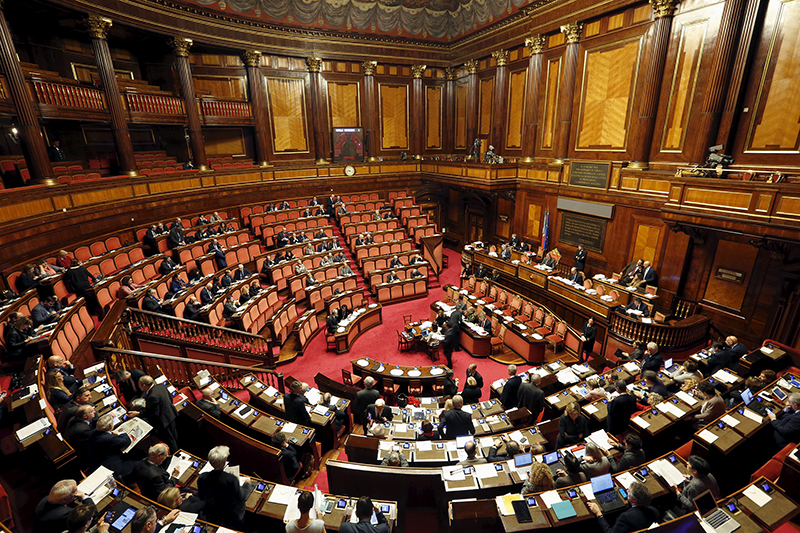
A general view shows the Italian Senate in Rome, January 28, 2016. Senate will begin debate on a bill that would legalise civil partnership for homosexuals as well as unmarried heterosexual couples. Photo courtesy of REUTERS/Remo Casilli
*Editors: This photo may only be republished with RNS-ITALY-GAY, transmitted on Feb. 26, 2016.
ROME (RNS) The Italian Senate’s decision to legalize same-sex unions is being viewed by many as a victory for conservative Catholics after those opposed to the bill succeeded in stripping a key component of the proposed law regarding family rights for gays.
Senators approved the bill — which will provide a new legal framework for straight or gay couples — on Thursday (Feb. 25) following nearly a month of intense debates over whether to legalize civil partnerships.
The bill passed with 173 votes in favor and 71 against and will now need to be approved by Italy’s Parliament before becoming law, a step widely viewed as a foregone conclusion. By a large margin Italians support civil unions for gays, though polls show they are against adoption rights.
The new provisions would formally recognize gay relationships for the first time in Italy — the only Western European country that has not done so — and grant couples certain pension and inheritance rights.
While the Vatican and the Italian hierarchy opposed the bill, the removal of a “stepchild adoption” clause was seen as a significant triumph for the Catholic Church. The measure was set to allow a person to adopt their partner’s biological child, which conservatives argued was a threat to the “traditional” family model.
Italy’s interior minister, Angelino Alfano, had strongly opposed the clause and succeeded in stripping it from the bill ahead of Thursday’s vote.
After the vote, Alfano said he was inspired by the words of St. John Paul II, who died in 2005.
“When it’s not possible to prevent or repeal an (intrinsically unjust) law … one could rightly offer their support to proposals to limit the damage of such a law,” he wrote on Facebook, citing the late pope.
But the Catholic Church and the Vatican had been viewed as taking a somewhat lower profile on this bill than in previous legislative battles.
Returning from Mexico earlier this month, for example, Pope Francis disappointed some of the bill’s opponents by saying that “the pope doesn’t get mixed up in Italian politics.”
On the other hand, the pontiff made his views clear in January, saying “there cannot be confusion between the family wanted by God and every other type of union.”
Moreover, the Vatican’s secretary of state, Pietro Parolin, reinforced the church’s position earlier this week when he supported the removal of the stepchild adoption measure. “The fundamental point is that civil unions are not equated in any way with marriage, that is that they are two completely distinct disciplines,” Parolin said, according to the Italian news agency ANSA.
The mixed result in the end left many unsatisfied.
The bill’s passage marked an “anthropological revolution” said Gianfranco Amato, one of the organizers of a huge, Catholic-led “Family Day” protest in Rome last month against the measure.
“For the first time … it’s Catholics that are doing these things,” he said, referring to Alfano and Prime Minister Matteo Renzi, who strongly supported the bill.
“This is incredible, they have produced a new family model,” Amato said. The outcome of the vote, he added, demonstrated that participants in the January protest had “no political representation” in Rome.
LGBT campaigners, on the other side, had said before the vote that the new legislation would be a failure if the stepchild adoption clause was not included.
The bill’s passage was a sharp disappointment for Arcigay, Italy’s leading LGBT organization.
“Today the Senate prepares to write an ugly page in the history of civil rights in our country … completely ignoring the existence and the needs of children of homosexual couples,” Arcigay said in a statement shortly before the vote.
(Rosie Scammell covers the Vatican for RNS)




